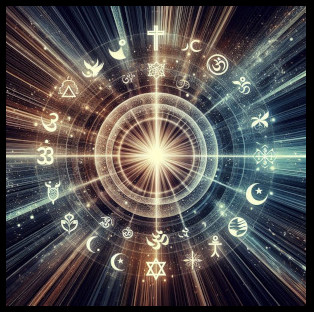Concepts of God
Let’s dive into the various ways different traditions and philosophies view God:
Classical Theism:
In classical theist traditions, God is seen as:
- Eternal: Existing beyond time and space.
- Omnipotent: All-powerful.
- Omniscient: All-knowing.
- Creator and Sustainer: The one who created and maintains the universe.
- Source of Morality: The ultimate foundation of what is right and wrong.
2. Henotheistic Religions:
Henotheistic religions recognize multiple deities, each considered divine by different groups of people. These deities can range from personal, supernatural beings to more abstract, philosophical entities. Examples include:
- Brahman in Hinduism.
- The Great Architect in Freemasonry.
- Summum Bonum, a philosophical concept of the highest good.
3. Pantheism and Panentheism:
- Pantheism: God is the universe itself, present in everything and everywhere.
- Panentheism: God is both within the universe and beyond it, transcending all while being immanent.
4. Aristotelian Concept of God:
- Aristotle’s Unmoved Mover: This concept involves a being that contemplates its own contemplation, is unchanging, and is perfect. It’s quite different from the personal God found in many religions.
5. Sikhism’s Concept of God:
- Ik Onkar: A formless, genderless, eternal reality.
- Creator, Sustainer, and Destroyer: Actively involved with creation and humanity.
- Self-Sufficient and Immutable: Beyond birth and death.
6. Western Thought:
- Theism: Belief in a God who created and sustains the universe.
- Deism: Belief in a God who created the world but doesn’t interfere in human affairs.
- Pantheism: God is the universe itself.
- Spinoza’s Pantheism: Everything is God, and God is everything.
These diverse views offer fascinating insights into philosophy, theology, and human experience, highlighting the rich tapestry of beliefs about the divine.
return

return
Let’s dive into the various ways different traditions and philosophies view God:
Classical Theism:
In classical theist traditions, God is seen as:
- Eternal: Existing beyond time and space.
- Omnipotent: All-powerful.
- Omniscient: All-knowing.
- Creator and Sustainer: The one who created and maintains the universe.
- Source of Morality: The ultimate foundation of what is right and wrong.
2. Henotheistic Religions:
Henotheistic religions recognize multiple deities, each considered divine by different groups of people. These deities can range from personal, supernatural beings to more abstract, philosophical entities. Examples include:
- Brahman in Hinduism.
- The Great Architect in Freemasonry.
- Summum Bonum, a philosophical concept of the highest good.
3. Pantheism and Panentheism:
- Pantheism: God is the universe itself, present in everything and everywhere.
- Panentheism: God is both within the universe and beyond it, transcending all while being immanent.
4. Aristotelian Concept of God:
- Aristotle’s Unmoved Mover: This concept involves a being that contemplates its own contemplation, is unchanging, and is perfect. It’s quite different from the personal God found in many religions.
5. Sikhism’s Concept of God:
- Ik Onkar: A formless, genderless, eternal reality.
- Creator, Sustainer, and Destroyer: Actively involved with creation and humanity.
- Self-Sufficient and Immutable: Beyond birth and death.
6. Western Thought:
- Theism: Belief in a God who created and sustains the universe.
- Deism: Belief in a God who created the world but doesn’t interfere in human affairs.
- Pantheism: God is the universe itself.
- Spinoza’s Pantheism: Everything is God, and God is everything.
These diverse views offer fascinating insights into philosophy, theology, and human experience, highlighting the rich tapestry of beliefs about the divine.
return

return